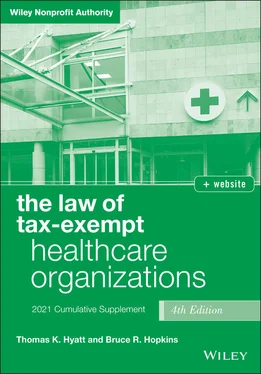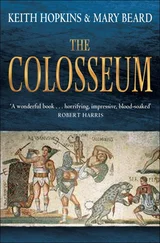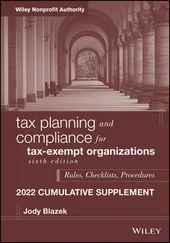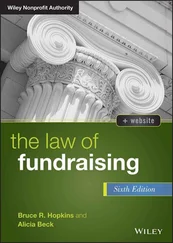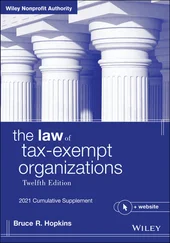Bruce R. Hopkins - The Law of Tax-Exempt Healthcare Organizations
Здесь есть возможность читать онлайн «Bruce R. Hopkins - The Law of Tax-Exempt Healthcare Organizations» — ознакомительный отрывок электронной книги совершенно бесплатно, а после прочтения отрывка купить полную версию. В некоторых случаях можно слушать аудио, скачать через торрент в формате fb2 и присутствует краткое содержание. Жанр: unrecognised, на английском языке. Описание произведения, (предисловие) а так же отзывы посетителей доступны на портале библиотеки ЛибКат.
- Название:The Law of Tax-Exempt Healthcare Organizations
- Автор:
- Жанр:
- Год:неизвестен
- ISBN:нет данных
- Рейтинг книги:4 / 5. Голосов: 1
-
Избранное:Добавить в избранное
- Отзывы:
-
Ваша оценка:
- 80
- 1
- 2
- 3
- 4
- 5
The Law of Tax-Exempt Healthcare Organizations: краткое содержание, описание и аннотация
Предлагаем к чтению аннотацию, описание, краткое содержание или предисловие (зависит от того, что написал сам автор книги «The Law of Tax-Exempt Healthcare Organizations»). Если вы не нашли необходимую информацию о книге — напишите в комментариях, мы постараемся отыскать её.
The Law of Tax-Exempt Healthcare Organizations — читать онлайн ознакомительный отрывок
Ниже представлен текст книги, разбитый по страницам. Система сохранения места последней прочитанной страницы, позволяет с удобством читать онлайн бесплатно книгу «The Law of Tax-Exempt Healthcare Organizations», без необходимости каждый раз заново искать на чём Вы остановились. Поставьте закладку, и сможете в любой момент перейти на страницу, на которой закончили чтение.
Интервал:
Закладка:
The congressional response to the COVID‐19 pandemic was to enact the largest economic stimulus legislation in U.S. history. The CARES Act impacted nonprofit healthcare organizations greatly by providing additional financial support after their rapid loss of revenue stemming from the cessation of traditional elective care and procedures and the ramp‐up to treat COVID patients. It included a forgivable loan program designed to ensure the maintenance of payrolls of which smaller healthcare organizations and related entities were able to take advantage. However, it was rolled out through ever‐changing real‐time “frequently asked questions” guidance that surely was never contemplated by the drafters of the Administrative Procedure Act.
In 2020, the IRS promulgated substantial proposed rules in connection with two major pieces of legislation, those pertaining to the allocation of expenses relative to unrelated business income under the “bucketing rule,” and the imposition of an excise tax on “excess compensation” received by executives of nonprofit organizations. Under the bucketing rule, an exempt organization with more than one unrelated business must compute unrelated business taxable income separately with respect to each unrelated business, as contrasted with the good old days when multiple unrelated trades or businesses could be aggregated together in order to reduce the tax bill. Under the excess compensation rule, if nonprofit executives receive compensation in excess of $1 million in salary or in certain retirement benefits, the employer is liable for a substantial excise tax payment on the amount in excess, with a carveout for income earned from certain medical services.
It would have been reasonable to assume that it would take some time for the IRS to digest comments received on these lengthy proposed regulations and to roll out final rules. Alas, this was not the case. Between the time that we began drafting this year's supplement in November and the return of the manuscript to us for review by the copyeditors in January, the final rules had already been published, necessitating a hasty update of these provisions in the supplement. We are at least pleased to report that this year's supplement is up‐to‐date, in these regards, as of February 1.
In other news, the IRS continued to tinker with compliance issues that have been challenging to regulate. These include continuing to impose the commerciality doctrine in a restrictive fashion on seemingly routine nonprofit business activities; enforcing the federal government's refusal to recognize the medicinal benefits of cannabis by declining to recognize exemption for nonprofits providing cannabis‐related services, by application of the public policy doctrine, notwithstanding the opposing viewpoint of a growing number of states; focusing virtually all of its audit activity on compliance by hospitals with the community health needs assessment provisions added to the Internal Revenue Code by the Affordable Care Act; and establishing substantially changed procedures for group exemption, presumably to address creative use of this opportunity by some organizations in recent years, in a fashion that the IRS admitted may impose additional administrative burdens.
In a time when guidance from the IRS as to exempt organization matters has significantly declined due to staffing and budget challenges, it can still be found in unlikely places. We have previously reported about the use of instructions to the Form 1023 and the Form 990 as a means of informally establishing new procedures and policies. This year we were able to glean meaningful intelligence from GAO reports issued in response to congressional inquiries that provided new detail as to IRS audit procedures and matters of interest.
As this supplement was going to press, a new president and a new administration were coming into view. Certainly, the election of President Biden portends the end of legislative efforts to undo the Affordable Care Act and the beginning of new efforts to strengthen and expand it. It seems likely that a federal government now controlled by the Democratic Party will move in new directions that are certain to result in changes to the law of tax‐exempt healthcare organizations. Stay tuned to this channel for breaking developments.
As always, we appreciate the assistance we have received from John Wiley & Sons in the preparation of this cumulative supplement. Our thanks are extended, in particular, to Brian T. Neill, development editor, Deborah Schindlar, project editor, and Jayaprakash Unni, production editor, for their assistance and support and connection with this cumulative supplement.
Thomas K. Hyatt
Bruce R. Hopkins
February 2021
About the Authors
Thomas K. Hyattis a partner in the law firm Dentons US LLP, resident in the Washington, DC office. His practice is focused on corporate and tax‐exempt organization issues for nonprofit organizations. He has particular expertise in legal issues affecting tax‐exempt healthcare providers and in governance and public policy issues affecting tax‐exempt higher education institutions. Mr. Hyatt has represented organizations including public and private hospitals, multihospital systems, integrated delivery systems, academic medical centers, home health agencies, health maintenance organizations, continuing care retirement communities, provider associations, physician clinics, faculty practice plans, physician‐hospital organizations, and shared services organizations in such matters. He also frequently works with nonprofit governing boards and board committees to address such issues as regulatory compliance, fiduciary duty, conflicts of interest, bylaws development and revision, senior management compensation and benefits, chief executive contracts and transition, fundraising, lobbying and political campaign activity, board development, policy development, adoption of best governance practices, membership matters, corporate restructuring, mergers, and joint ventures. He is admitted to practice in the District of Columbia and Pennsylvania.
Mr. Hyatt is a member of the American Health Lawyers Association (AHLA), the American Bar Association, and the District of Columbia Bar. He served as a member of AHLA's Board of Directors from 1992 to 1998. Mr. Hyatt is one of the inaugural Fellows of AHLA. He is the Chair Emeritus and on the faculty of the annual Tax Issues in Healthcare Organizations seminar sponsored by AHLA, and is also the past chair of AHLA's Tax and Finance Practice Group. In 2004, Mr. Hyatt received AHLA's David J. Greenburg Service Award. He also serves as Senior Fellow for Public Policy with the Association of Governing Boards of Universities and Colleges. He has been listed in Best Lawyers in America since 2005 and as a DC Super Lawyer. He has also been listed in Chambers USA Healthcare, District of Columbia, since 2012. Mr. Hyatt is a licensed consultant for the Standards for Excellence Institute. He frequently lectures on business and tax planning issues for nonprofit organizations and has written numerous articles for publication on tax‐exempt organization topics. Mr. Hyatt received the 2017 Outstanding Nonprofit Lawyer award from the American Bar Association.
Mr. Hyatt is a 1979 cum laude graduate of Boston College, and received his law degree in 1982 from the University of Pittsburgh, where he served as editor‐in‐chief of the Journal of Law and Commerce .
Bruce R. Hopkinsis the principal in the law firm Bruce R. Hopkins Law Firm, LLC, in Kansas City, Missouri. He concentrates on the representation of tax‐exempt organizations, including healthcare organizations. His practice ranges over the entirety of law matters involving exempt organizations, with emphasis on the formation of nonprofit organizations, acquisition of recognition of tax‐exempt status for them, governance and the law, the private inurement and private benefit doctrines, the intermediate sanctions rules, legislative and political campaign activities issues, public charity and private foundation rules, unrelated business planning, use of exempt and for‐profit subsidiaries, joint venture planning, tax shelter involvement, review of annual information returns, Internet communications developments, the law of charitable giving (including planned giving), and fundraising law issues.
Читать дальшеИнтервал:
Закладка:
Похожие книги на «The Law of Tax-Exempt Healthcare Organizations»
Представляем Вашему вниманию похожие книги на «The Law of Tax-Exempt Healthcare Organizations» списком для выбора. Мы отобрали схожую по названию и смыслу литературу в надежде предоставить читателям больше вариантов отыскать новые, интересные, ещё непрочитанные произведения.
Обсуждение, отзывы о книге «The Law of Tax-Exempt Healthcare Organizations» и просто собственные мнения читателей. Оставьте ваши комментарии, напишите, что Вы думаете о произведении, его смысле или главных героях. Укажите что конкретно понравилось, а что нет, и почему Вы так считаете.
